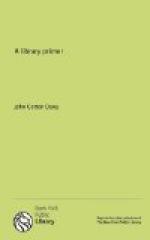From a very unpretentious concern, publishing a few library aids, manufacturing such library devices as could not be obtained elsewhere, and keeping for sale a few articles of library furnishing, the Library Bureau has grown to be a corporation of no small proportions, having numerous branches both in this country and Europe, maintaining a card factory, cabinet works in Boston and Chicago, and facilities for the manufacture of steel stacks unexcelled in this country.
The Library Bureau, however, has never forgotten the cause of its birth or the teachings of its youth, as is clearly evidenced from year to year by the various undertakings and publications which a careful observer can clearly see are not put forward with any presage of success when viewed entirely from a business standpoint. This lesson is constantly taught to the employes of the Library Bureau, and they are positively instructed that, regardless of the promise of success in other directions, the attention to library requirements is the first demand.
The Library Bureau maintains at its various offices persons thoroughly versed in library economy, for the express purpose of furnishing detailed information and aid to those younger members of the profession whom they have the pleasure and opportunity of assisting over the stumbling-blocks in their daily work. With this same idea in view it publishes from the Chicago office a monthly magazine called PUBLIC LIBRARIES, of an elementary character, which is entertaining, instructive, and inspiring, and helps to encourage a sentiment favorable to public libraries and to make librarianship a profession of high standing.
CHAPTER XI
Selecting books—Fitting the library to its owners
The selection of books should be left to the librarian, under the general direction of trustees or book committee.
There should be made at the start a collection of encyclopedias, dictionaries, gazetteers, and scientific compendiums, which should not be lent. The extent of this collection will depend on the scope and purposes of the library. No library, however small, can dispense with some books of reference. But for a small library don’t buy expensive works. The Encyclopaedia Britannica is an example of what not to get.
There must be taken into consideration, in determining the character of the books to be purchased, these factors among others:
a) Presence or absence of other libraries in the vicinity, and their character, if present.
b) The avowed purposes of the free, tax-supported public library, to-wit: 1) To help people to be happy; 2) to help them to become wise; 3) to encourage them to be good.
c) The amount of money to be expended and the sum that will probably be available for each succeeding year.
d) The manner in which the books are to be used; whether they are to be lent, or are to be used only for reference, or are to form both a reference and a lending library.




